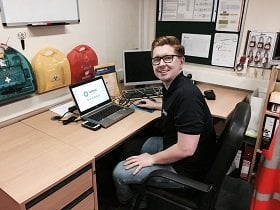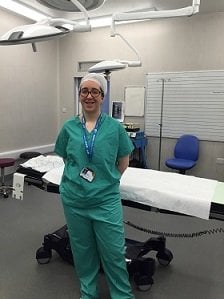Higher apprenticeships – building a healthy foundation
 The University of Derby Strategic Partnership Unit creates relationships with employers, to help students get the most out of their educational experience.
The University of Derby Strategic Partnership Unit creates relationships with employers, to help students get the most out of their educational experience.
Two of those learners, Sarah who works for the NHS and John, who works for Tarmac Lafarge, told us what it’s like studying for a degree as part of their higher apprenticeships.
John Gamble – second year, Mineral Product Technology Higher Apprenticeship
John, aged 26, works at Tarmac Lafarge at Mount Sorrel quarry, Leicestershire. He’s part of a work-based higher education programme, developed jointly by the  industry, its professional bodies and the University of Derby.
industry, its professional bodies and the University of Derby.
He sometimes attends study block weekends, and project weeks, and completes his assignments online, supported by the course lecturers. The course covers relevant sector training that coincides with the development of his role within the company.
John will graduate with no student debt, and the potential to become a manager – investing his time back into the business by mentoring the next generation of apprentices.
Why did you apply for an apprenticeship?
After being made redundant from a graduate job working in a forensic laboratory, I wanted a more ‘hands-on’ job with training, so I didn’t have my head in books every day.
Was it the right decision?
Definitely! In the past year and a half I have learnt new valuable skills and developed my current skills. I have also learnt lots about myself and how I work under pressure – balancing my work and academic life.
What appealed to you specifically about the apprenticeship?
I wanted to learn on the job, but still come into university sometimes. I liked distance learning and the online library. I also knew I wouldn’t have any debt at the end of the apprenticeship.
What was the apprenticeship application like?
It was simple. The layout followed a typical job application, giving the employer a clear image of me and what I am like in certain scenarios.
How long is your apprenticeship?
Three years – I started in September 2014.
What would you say to someone trying to decide if an apprenticeship is right for them?
If they were considering university or an apprenticeship, I would say to think about the job prospects after achieving a university degree. Most people don’t get a job in the field they studied. And you’ll have the university debt to pay back over a number of years.
It’s important to consider an apprenticeship – you learn on the job, get a wage and study at the same time. If you want to further your studies, companies usually pay your tuition fees if you want to achieve a degree or some other form of higher education programme.
Are you given adequate support during your apprenticeship?
I received huge amounts of support, especially from my manager. He lets me take a day and a half each week to get on with my university work, so I don’t get snowed under. He says if he doesn’t give me the support, then he/the company are setting me up to fail, which will not be in my best interest or the company’s.
What are your plans and ambitions after completing your apprenticeship?
I would like to continue into a manager’s role, and even look at furthering my education.
Sarah Bannister, Trainee Assistant Practitioner Higher Apprenticeship
Sarah worked as a dental nurse for six years and felt she'd reached her full potential. She was ready for a new challenge. 
After an interview, Sarah got a position as a trainee assistant practitioner, working in an operating theatre environment and specialising in maxillofacial surgery. This also gave her a position at the University of Derby to do a foundation degree alongside her work.
Why did you apply for an apprenticeship?
I liked how you were able to study and then apply the skills and knowledge you learnt in a professional environment. I also wanted to earn an income.
Was it the right decision?
It was definitely the right decision. I needed something where I could be challenged and really wanted to study further. But no one in my family had done further study before. The higher apprenticeship is giving me the challenge I needed academically and personally. I have seen myself become more confident and learned skills that I wouldn’t be able to in a classroom.
What was the apprenticeship application like?
It was all done very professionally and to a high standard. I first went to a meet and greet where I got to understand and gather more information about the environment, role and course. I then attended an interview that included training mangers from the department I had applied for, and a course leader from university.
Talk us through what you love about your apprenticeship and the things you get to do on it.
I’m a trainee assistant practitioner in an operating theatre environment specialising in maxillofacial surgery. Working in this environment as an apprentice allows me to do the scrub role. I get to scrub-in for cases that range from day case surgery, trauma surgery and big oncology (cancer) cases. Being a part of a team that can help make a patient’s life easier is very rewarding. I love that each day is different with a new challenge and there is always something new to learn.
Have you earned any qualifications from your apprenticeship? If so, how can they help you?
At the end of my apprenticeship I will have gained a foundation degree science in professional development (health and social care). This can help me in the future to apply for further study opportunities, such as nursing.
What are the most important skills you’ve learnt from this apprenticeship?
Communication, team work, courage and confidence are some of the key skills within an operating theatre environment. My role means I am also an advocate for the patient, so communicating and working in a team is vital to ensure the patient gets the best care. I use all these skills – from ensuring I have all the necessary equipment for a case, to making individuals aware when I feel the patient would benefit from something, such as a warm blanket after a procedure.
Nottingham University Hospitals NHS Trust
How does your apprenticeship program fit within the wider make-up of your organisation?
The Trust firmly believes in the development and training of staff of all grades. There are plans to further expand our apprenticeship workforce at NUH, to increase access and opportunities. Apprentices will hopefully remain with us in the Trust and progress to further learning and education within the healthcare setting. We want our apprentices to be proud to be part of team NUH.
Describe your professional relationship with your apprentices. What do they bring to the company?
They have integrated well within our theatre teams. Our aim has always been to produce high quality, competent assistant theatre practitioners who are working to a high standard, promoting safe practice within the operating theatres.
Are you glad to be a part of the apprenticeship programme? Tell us what makes you glad.
The apprenticeship provides us with the ability to talent-spot individuals and allow them to grow within an ever expanding role. I am proud to be part of their journey; teaching, nurturing and delivering their practical experience and assisting them to achieve their full potential.
What do you see as the benefits to the apprentice?
This programme is a fantastic opportunity to work as an employee in a large diverse teaching hospital environment, whilst achieving an academic qualification that will enable you to either have:
- job satisfaction
- qualifications that will springboard your career
What support systems do you have to ensure apprentices are happy with their work and learning?
We have a designated training team that organise all training and learning in the theatre complex. There is an open door policy for all learners and we offer coaching and support to the students. We have a very good working relationship with the University of Derby and there are structured bi-monthly meetings to address any concerns regarding gaps in their learning, either at university or in practice.